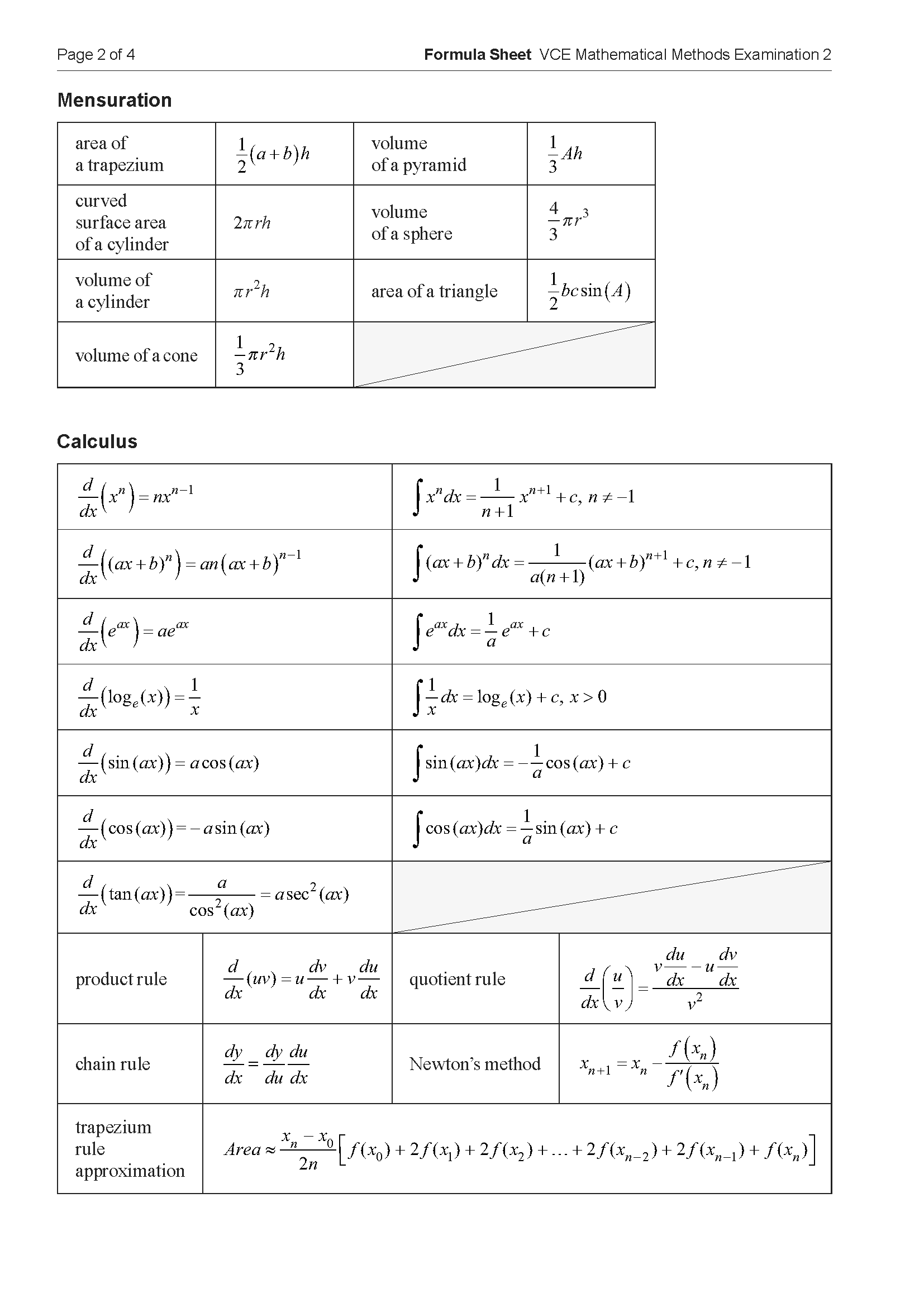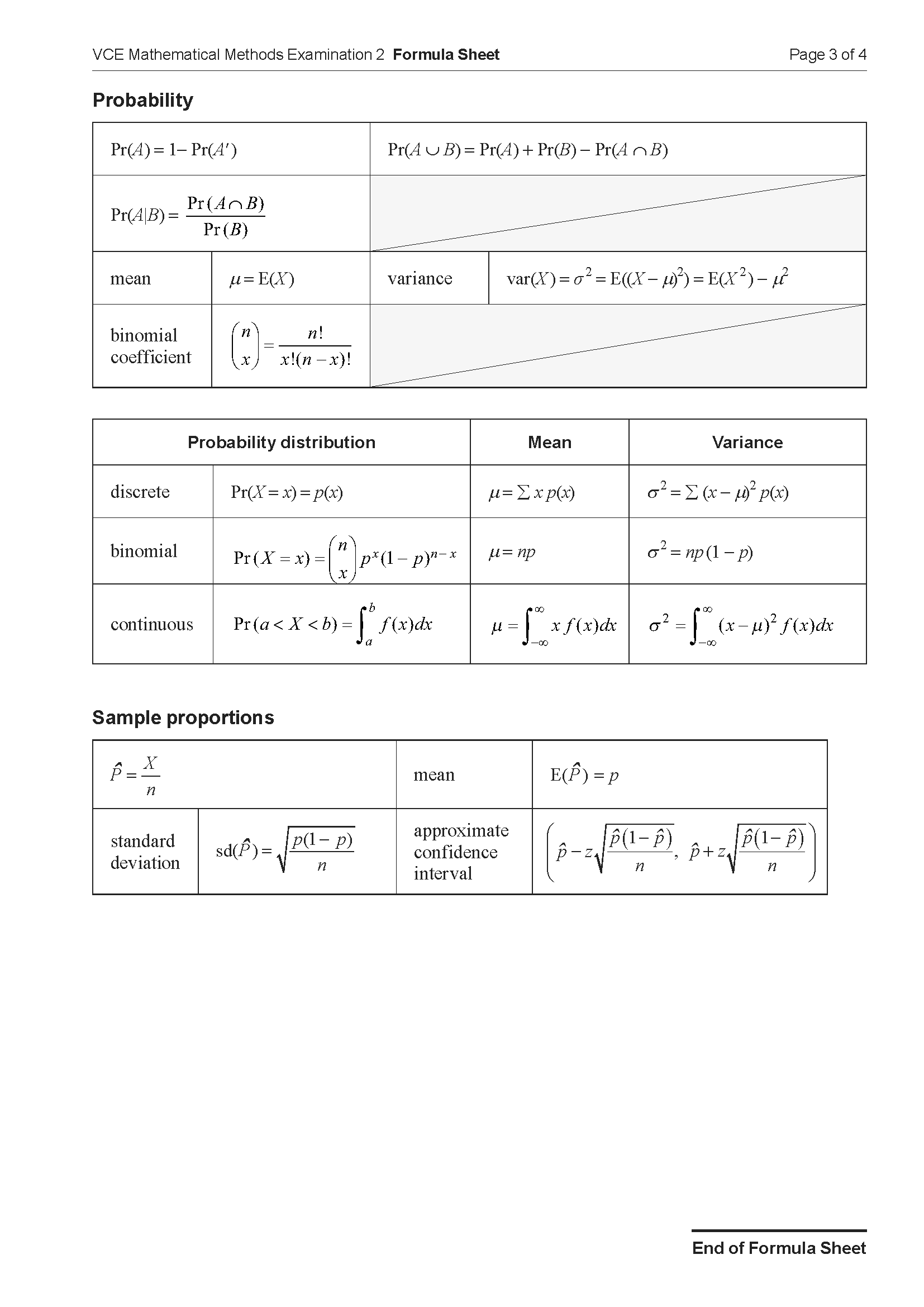VCE Maths Methods Basic Probability Mini Test 3
Number of marks: 10
Reading time: 2 minutes
Writing time: 15 minutes
Section A – Calculator Allowed
Instructions
• Answer all questions in pencil on your Multiple-Choice Answer Sheet.
• Choose the response that is correct for the question.
• A correct answer scores 1; an incorrect answer scores 0.
• Marks will not be deducted for incorrect answers.
• No marks will be given if more than one answer is completed for any question.
• Unless otherwise indicated, the diagrams in this book are not drawn to scale.
A bag contains three red pens and \( x \) black pens. Two pens are randomly drawn from the bag without replacement.
The probability of drawing a pen of each colour is equal to
- A. \( \frac{6x}{(2 + x)(3 + x)} \)
- B. \( \frac{3x}{(2 + x)(3 + x)} \)
- C. \( \frac{x}{2 + x} \)
- D. \( \frac{3 + x}{(2 + x)(3 + x)} \)
- E. \( \frac{3 + x}{5 + 2x} \)
\(A\) and \(B\) are events from a sample space such that \(\Pr(A) = p\), where \(p > 0\), \(\Pr(B|A) = m\) and \(\Pr(B|A') = n\).
\(A\) and \(B\) are independent events when
- A. \(m = n\)
- B. \(m = 1-p\)
- C. \(m+n = 1\)
- D. \(m = p\)
- E. \(m+n = 1-p\)
A box contains \(n\) marbles that are identical in every way except colour, of which \(k\) marbles are coloured red and the remainder of the marbles are coloured green. Two marbles are drawn randomly from the box.
If the first marble is not replaced into the box before the second marble is drawn, then the probability that the two marbles drawn are the same colour is
- A. \(\frac{k^2 + (n-k)^2}{n^2}\)
- B. \(\frac{k^2 + (n-k-1)^2}{n^2}\)
- C. \(\frac{2k(n-k-1)}{n(n-1)}\)
- D. \(\frac{k(k-1) + (n-k)(n-k-1)}{n(n-1)}\)
- E. \(^nC_2\left(\frac{k}{n}\right)^2\left(1-\frac{k}{n}\right)^{n-2}\)
End of Section A
Section B – No Calculator
Instructions
• Answer all questions in the spaces provided.
• Write your responses in English.
• In questions where a numerical answer is required, an exact value must be given unless otherwise specified.
• In questions where more than one mark is available, appropriate working must be shown.
• Unless otherwise indicated, the diagrams in this book are not drawn to scale.
A paddock contains 10 tagged sheep and 20 untagged sheep. Four times each day, one sheep is selected at random from the paddock, placed in an observation area and studied, and then returned to the paddock.
a. What is the probability that the number of tagged sheep selected on a given day is zero? 1 mark
b. What is the probability that at least one tagged sheep is selected on a given day? 1 mark
c. What is the probability that no tagged sheep are selected on each of six consecutive days? Express your answer in the form \(\left(\frac{a}{b}\right)^c\), where \(a\), \(b\) and \(c\) are positive integers. 1 mark
For Jac to log on to a computer successfully, Jac must type the correct password. Unfortunately, Jac has forgotten the password. If Jac types the wrong password, Jac can make another attempt. The probability of success on any attempt is \(\frac{2}{5}\). Assume that the result of each attempt is independent of the result of any other attempt. A maximum of three attempts can be made.
a. What is the probability that Jac does not log on to the computer successfully? 1 mark
b. Calculate the probability that Jac logs on to the computer successfully. Express your answer in the form \(\frac{a}{b}\), where \(a\) and \(b\) are positive integers. 1 mark
c. Calculate the probability that Jac logs on to the computer successfully on the second or on the third attempt. Express your answer in the form \(\frac{c}{d}\), where \(c\) and \(d\) are positive integers. 2 marks
End of examination questions
VCE is a registered trademark of the VCAA. The VCAA does not endorse or make any warranties regarding this study resource. Past VCE exams and related content can be accessed directly at www.vcaa.vic.edu.au

